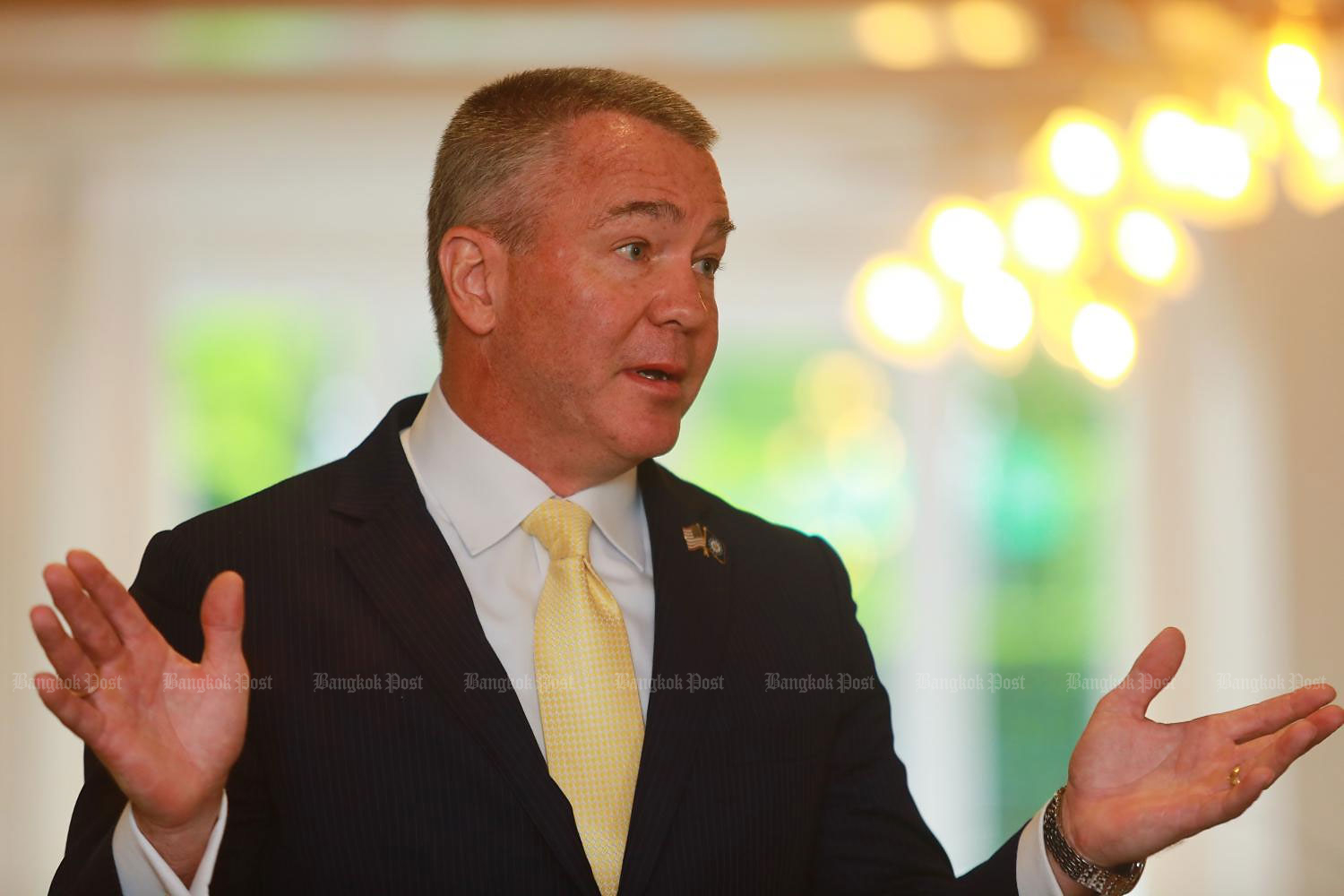
Thailand has been a victim of its own success in eliminating domestic Covid-19 infections and must find a way to balance the needs of the economy with virus prevention, the US ambassador to Thailand said while on a recent mission to the Eastern Economic Corridor (EEC).
"Ultimately it is up to Thailand on how to determine that balance, but there are costs on either side," Michael DeSombre said during a press tour of three factories owned by US companies in the EEC last week. "If you keep the economy shut down, or in this case international travel shut down, it obviously affects certain people's livelihoods, but if you open it up you certainly will have more infections."
The same day as the EEC tour, US President Donald Trump tested positive for the coronavirus, and since then the bug has spread through the highest levels of the US government and military.
"The evidence over the last six months shows that the costs of a really extreme shutdown are generally worse than the benefits and it is better to keep the economy running," Mr DeSombre said.
He said Thailand can likely handle hundreds of cases a day for a country of its size, similar to the peak level of infections in April.
"Thailand in many respects is a victim of its own success, but because it was so good at getting rid of the virus completely, everybody is scared of that one case," Mr DeSombre said. "For instance, if over the last three months we had three cases every day or five cases or even 100 cases in a population of 70 million and it was not getting out of control and a very small percentage were serious and people were doing the necessary precautions, then it would be easier to open up the country even more."
He said the situation in the US is quite manageable and the country's case numbers, the highest in the world in terms of total cases, have not significantly hindered US firms' ability to do business abroad.
"Cases in the US have gone down significantly -- we are talking 35,000 cases a day for a population of 380 million, so it is at a level that is generally manageable and generally low and the mortality rate is quite low," he said. "The US is now focusing on protecting people at risk and making sure the economy keeps operating at this time while we as quickly as possible develop a vaccine."
On Oct 2, the day of the EEC trip, there were over 50,000 new cases in the US and 842 deaths.
Despite his warnings on economic impact, Mr DeSombre commended the Thai government and healthcare system's response to bringing domestic cases to zero over the past few months.
"I believe the healthcare system can handle hundreds of cases, especially for a country of this size," he said.
STRENGTHENING TIES
The EEC has done a good job attracting foreign investment, Mr DeSombre said. But he recommended that regulatory hurdles be eased and the process for applying for subsidies be simplified.
"A lot of the EEC incentive packages have been quite good, but in some areas the packages are not quite as competitive as those offered in other countries, and the government needs to look at that," he said. "For example, some of the R&D proposals were not as simple and executable as others."
In July, the US Embassy submitted a list of proposals to the Thai government to improve economic cooperation between the two countries, which included following through with the "regulatory guillotine" by cutting burdensome regulations, removing restrictions on skilled foreign labour and using pandemic relief money to encourage foreign investment.
One US company will open a new facility in Thailand by the end of the year, but Mr DeSombre was not at liberty to name the firm.
"There is one advanced material company that we know did a survey of 24 different countries -- specifically looking at regulatory environment, incentives and ease of doing business -- and chose Thailand for its advanced material plant they are setting up," he said. "This is one example of advanced US companies bringing production here."
Mr DeSombre said that of the US companies he has spoken with over the past few months, none has expressed concern that political tensions in Thailand surrounding the student-led anti-government protests would impact their business or investment decisions.
THE HUAWEI CONUNDRUM
The US is widely perceived to have lost ground to China both politically and economically over the last few decades -- a far cry from the mid-20th century, when the superpower used Thailand as a major operations base for its war against Vietnam.
The US has warned other nations of the possible security risk of using technology from the Chinese telecom company Huawei in their roll-outs of 5G networks, due to the firm's close ties with the Chinese government.
Huawei will likely be a major supplier of 5G equipment in Thailand because of low prices and the cosy relationship it enjoys with the government.
On the other hand, US companies have been relatively sidelined in Thailand's 5G roll-out, with the main alternatives to Huawei being Finland's Nokia and Sweden's Ericsson.
"Huawei happened to be at the right place at the right time, offering prices that seem very competitive for reasons that aren't market-based," Mr DeSombre said. "Ericsson, Nokia and Samsung are all good companies that are not state-owned and obligated to share information with their intelligence services without disclosing."
This year the US government announced the Clean Path Initiative to protect data entering US embassies on 5G networks that use Huawei technology. US companies will likely have to decide whether using Thailand's 5G network represents a security risk.